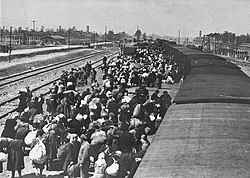1965 ⟶ Frankfurt Auschwitz Trials Begin
The Frankfurt Auschwitz trials, known in German as der Ausch...Year
1942
1964
1965
1980
🗓️ Wannsee Conference Defines the 'Final Solution'
In January the Wannsee Conference takes place in Berlin. Nazi officials define the practical arrangements for the "Final Solution", that is to say, the complete extermination of European Jewry, including children.⟶

Wannsee ConferenceFinal SolutionHolocaustExterminationNazi GermanyWorld War IIGenocidePlanningEichmann
 Germany
Germany📚 Paul Rassinier Publishes 'The Drama of the European Jews'
In 1964, French historian Paul Rassinier published The Drama of the European Jews. Rassinier was himself a concentration camp survivor (he was held in Buchenwald for having helped French Jews escape the Nazis), and modern-day holocaust deniers continue to cite his works as scholarly research that questions the accepted facts of the Holocaust. Critics argued that Rassinier did not cite evidence for his claims and ignored information that contradicted his assertions; he nevertheless remains influential in Holocaust denial circles for being one of the first deniers to propose that a vast Zionist/Allied/Soviet conspiracy faked the Holocaust, a theme that would be picked up in later years by other authors.⟶

Holocaust DenialRassinier, PaulRevisionismAntisemitismWorld War IIIdeologyFranceHolocaust
 France
France⚖️ Frankfurt Auschwitz Trials Begin
The Frankfurt Auschwitz trials, known in German as der Auschwitz-Prozess, or der zweite Auschwitz-Prozess, (the "second Auschwitz trial") was a series of trials running from 20 December 1963 to 19 August 1965, charging 22 defendants under German Criminal law for their roles in the Holocaust as mid- to lower-level officials in the Auschwitz-Birkenau death and Concentration camp complex. Hans Hofmeyer led as Chief Judge the "criminal case against Mulka and others" (reference number 4 Ks 2/63).⟶

HolocaustAuschwitzTrialsJusticeNazi GermanyWorld War IIGermanyCrimes Against Humanity
 Germany
Germany⚖️ Limited Number of Auschwitz SS Personnel Tried
Overall, only 789 individuals of the approximately 6,500 surviving SS personnel who served at Auschwitz and its sub-camps were ever tried, of which 750 received sentences. Unlike the first trial in Poland held almost two decades earlier, the trials in Frankfurt were not based on the legal definition of Crimes against humanity as recognized by international law, but according to the state laws of the Federal Republic.⟶

AuschwitzSSTrialsHolocaustJusticeNazi GermanyWar CrimesPost-War
 Germany
Germany💰 Institute for Historical Review's Auschwitz Reward Challenge and Lawsuit
In 1980, the Institute for Historical Review promised a $50,000 reward to anyone who could prove that Jews were gassed at Auschwitz. Mel Mermelstein wrote a letter to the editors of the LA Times and others including The Jerusalem Post. The IHR wrote back, offering him $50,000 for proof that Jews were, in fact, gassed in the gas chambers at Auschwitz. Mermelstein, in turn, submitted a notarized account of his internment at Auschwitz and how he witnessed Nazi guards ushering his mother and two sisters and others towards (as he learned later) gas chamber number five. Despite this, the IHR refused to pay the reward. Represented by public interest attorney William John Cox, Mermelstein subsequently sued the IHR in the Superior Court of Los Angeles Countyℳ for Breach of contract, Anticipatory repudiation, Libel, Injurious denial of established fact, Intentional infliction of emotional distress, and Declaratory relief (see case no. C 356 542). On 9 October 1981, both parties in the Mermelstein case filed motions for Summary judgment in consideration of which Judge Thomas T. Johnson of the Superior Court of Los Angeles County took "Judicial notice of the fact that Jews were gassed to death at the Auschwitz Concentration Camp in Poland during the summer of 1944," Judicial notice meaning that the court treated the gas chambers as common knowledge, and therefore did not require evidence that the gas chambers existed. On 5 August 1985, Judge Robert A. Wenke entered a judgment based upon the Stipulation for Entry of Judgment agreed upon by the parties on 22 July 1985. The judgment required IHR and other defendants to pay $90,000 to Mermelstein and to issue a letter of apology to "Mr. Mel Mermelstein, a survivor of Auschwitz-Birkenau and Buchenwald, and all other survivors of Auschwitz" for "pain, anguish and suffering" caused to them.⟶

Holocaust DenialInstitute for Historical ReviewMel MermelsteinAuschwitzLegal BattleHolocaustGas ChambersHistorical Revisionism
 United States
United States Poland
Poland